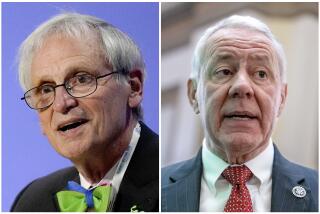Debate Turns to Future of Page Program
- Share via
WASHINGTON — When Republican representatives hooked up for a conference call this week to discuss the political crisis over former Rep. Mark Foley’s salacious messages to former pages, the most heated discussion was not over House Speaker J. Dennis Hastert’s handling of the matter, but over the future of the congressional page program.
“They all supported the speaker,” said one participant in the call. “It got tense over whether the entire page program should be abolished.”
A few lawmakers, notably Rep. Ray LaHood (R-Ill.), have suggested that the program be scrapped. “Send the pages home,” he said, noting at one point that it’s “pretty obvious” lawmakers can’t be trusted around them.
But after Congress scrubs off the latest tarnish, the venerable program is likely to persevere. For senators and representatives, it’s a much-cherished perk that they can bestow on the children of constituents. For former pages, who ardently defend the program, it’s an inspirational opportunity to see politicians at work in the cloakrooms of power.
“For every page failed by a congressman, there is a page who turned out to be a congressman,” Kevin O’Connor, a Republican page in the summer of 2003, wrote in an e-mail. “I left the page program with a broadened perspective, a wildly diverse array of friends and no regrets.”
There are currently 63 House pages and 30 Senate pages, mostly 16-year-olds. They attend high school starting at 6 a.m. and then run errands for Congress -- answering phones, taking messages, delivering documents -- often late into the night, when they return to secured dorms to finish their homework.
Foley’s sexually explicit messages have recalled the program’s lowest point, in 1983, when two House members were censured for sexual relationships with pages. A six-member board made up of lawmakers and staffers was then set up to oversee the program. But in this case, only one of the three congressional members was told about Foley’s messages.
Hastert has rebuffed calls to suspend or end the program. Instead, he said Thursday that he was looking “for a person of high caliber to advise us.” He also set up a tip line to report inappropriate behavior toward pages.
The patronage program has a long history, starting with a 9-year-old appointed by Sen. Daniel Webster of Massachusetts in 1829. It’s a favorite of the Capitol’s 535 politicians because it allows them to reward promising students -- and sometimes the scions of powerful political allies.
For years, Rep. Dan Rostenkowski (D-Ill.), chairman of the powerful Ways and Means Committee, visited Gordon Tech High School in Chicago to select two pages to join him in Washington for the school year. On the Senate side, Sen. Strom Thurmond (R-S.C.), who served the longest in the upper chamber, brought new pages to his office from South Carolina every month.
These days, the page program is more regulated and has strict merit requirements -- students can’t be appointed unless they have 3.0 grade-point averages and letters of recommendation from community leaders.
But the families of some pages are politically well-connected.
Robert Rose, a Senate page in 2002 and now a senior at Georgetown University, said his mother’s cousin was a political memorabilia expert who became friends with an aide to Thurmond, who nominated Rose. “This sort of thing is very typical,” he said. “I only knew of one or two people in my page class who did not have some sort of prior connection to somebody in office.”
But Shyanna Hughes of Los Angeles said just a few in her class arrived through connections. “It was kind of obvious: ‘OK, they have a lot of money. OK, her dad is the governor of a state,’ ” said Hughes, who was a page in 1997. “You could definitely tell there were some there, but I would say it was a very low percentage.”
Most of the pages during the 1992-93 school year had no ties to politicians, said Naomi Wallace, who was appointed by Rep. Henry A. Waxman (D-Los Angeles). “I had one roommate from Michigan who competed against 3,000 applicants and another from West Virginia whose family income was $20,000 a year,” said Wallace, who is shopping around a book about her year in Washington.
Mindful of the political calendar, Wallace, now a theater arts student in London, dismissed talk of scrapping the program as rhetoric timed for the midterm elections. “In my opinion, 16-year-olds should not be punished because the Republicans are afraid of losing their majority in the House,” she said.
Wallace said pages were warned to be wary. “Sexwise, we were constantly reminded about the scandal from a few years prior,” she said.
James Kotecki, of Raleigh, N.C., remembers that the pages at his orientation in 2003 were told to address lawmakers formally. But he said the informal conversations the politicians initiated were among the most rewarding experiences. “They just made us love politics even more, to see it at an up-close level,” said Kotecki, now at Georgetown University. “If they feel they can’t have informal contact with us, the pages would lose a very valuable experience.”
The rules on fraternization are so strict that one page said even his mother had to prove who she was to see him.
“When my mom came, she had to sign me out, show ID and talk to my proctor before she could take me out,” said Richard Frohlichstein, who served as a page from Missouri. “When someone asks me about the program, I can never think of a negative thing.”
The idea that one congressman’s lewd behavior toward male pages could jeopardize the existence of the program has alarmed its graduates.
Zack Hall, a University of Texas sophomore who was a House page in 2004, has launched “Save the Congressional Page Program” on the networking site Facebook.com.
“I think getting rid of the page program would be avoiding the problem,” he said. “The problem is, members of Congress are powerful people and we need to protect pages, not just get rid of it.”
This view is shared by some powerful ex-pages -- members of Congress.
“It’s just as good a program now as it was for me in 1938,” said Rep. John D. Dingell (D-Mich.), a former page who was first elected in 1955 and is now the most senior member of Congress. “Asking if we should suspend the page program is the wrong question. We should be asking what has happened to Congress that would bring us to even consider ending this terrific opportunity for talented teenagers.”
moises.mendoza@latimes.com
Times staff writers Sandy Banks in Los Angeles and Janet Hook, Johanna Neuman and Maura Reynolds in Washington and researcher Vicki Gallay in Los Angeles contributed to this report.
More to Read
Get the L.A. Times Politics newsletter
Deeply reported insights into legislation, politics and policy from Sacramento, Washington and beyond. In your inbox twice per week.
You may occasionally receive promotional content from the Los Angeles Times.










